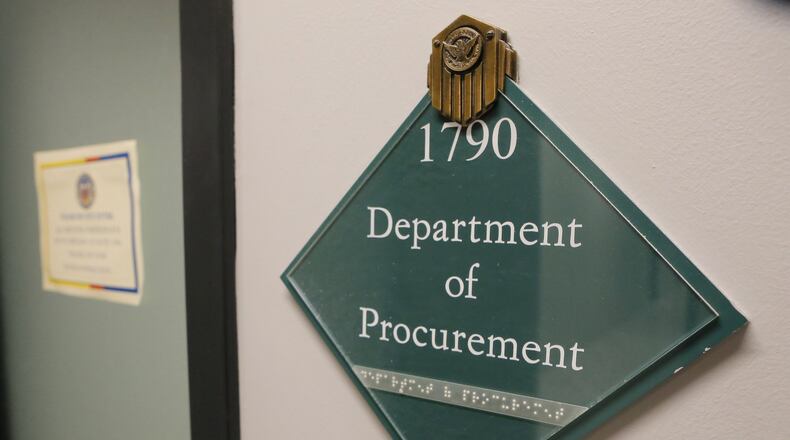The federal investigation into bribery at Atlanta City Hall may be expanding into a probe of possible conflicts of interest involving some of the city’s biggest contracts, which could include major projects at Hartsfield-Jackson International Airport and the city’s troubled watershed department, an Atlanta Journal-Constitution analysis of records shows.
City officials have until Tuesday to turn over documents demanded in an 11-point grand jury subpoena delivered Feb. 21 — the day the city's top purchasing officer, Adam Smith, was fired and federal agents seized the computer and phone from his office.
Federal prosecutors want documents since Jan. 1, 2014, showing Smith certified to City Council that companies that won contracts of $1 million or more disclosed personal and financial relationships with city officials and their family members and “that the award of the contract is appropriate.” The subpoena, the third to become public, also demands all “written determinations” of conflicts by Smith since 2014.
An AJC analysis found more than $2.1 billion in city council approved contract awards of $1 million or more in the time frame covered by the subpoena. Of those 287 awards, more than half of the tax dollars — $1.1 billion — was committed to contracts at the airport. An additional $786 million was for contracts tied to the watershed and public works departments.
The AJC analysis shows investigators may be moving in a new direction with the federal probe, which came to light in January when contractor Elvin "E.R." Mitchell Jr. was charged and pleaded guilty to conspiracy to commit bribery. Since then, contractor Charles P. Richards Jr. also has pleaded guilty to the conspiracy.
Combined, the men paid more than $1 million in bribes to an unidentified person, believing the money would be shared with influential city officials.
An AJC investigation last month found that Mitchell was paid $7.3 million since 2010, mostly for emergency contracts in response to winter storms in 2011 and 2014. Richards' company has collected more than $10.8 million in contracts from the city, often using one of Mitchell's companies as a minority subcontractor, the AJC previously reported.
Only one contract in the 287 awards identified by the AJC was with Richards and Mitchell — a $1.6 million amendment to an annual sidewalk contract won by C.P. Richards Construction Co., with Mitchell's Cascade Building Systems listed as a minority subcontractor. The AJC has previously reported that the sidewalk contract was amended 20 times over six years.
The February subpoena, however, indicates the federal investigation may be turning from relatively small public works contracts to some of the largest the city awarded.
"This is a different league," Joe Whitley, a former U.S. Attorney who ran the Atlanta office from 1990-93, said of the information requested in the Smith subpoena. "I can't say that it's (definitely) true, but those are indicators to me that the investigation has grown … and gone into another area."
AJC reporters identified million-dollar contracts by scouring three years of City Council meeting minutes. The list may not reflect the full universe of contracts that would fall under the subpoena but does include contract extensions, amendments, renewals, task orders, change orders and increases in maximum compensation of $1 million or more.
The roster of awards the AJC compiled does not include all contracts that started for less than $1 million and later grew to seven figures. It also does not include lucrative long-term deals between the city and concessionaires at the Atlanta airport, which over years can return millions of dollars in rent for the city and billions of dollars collectively in sales for merchants and restaurant operators that line the concourses.
No city officials have been charged in the investigation, and the Smith subpoena was the first seeking information about an active member of Mayor Kasim Reed’s cabinet.
The Reed administration has declined to say why Smith was fired last month on the day federal agents served the subpoena. And in Smith’s separation notice, filed with the Georgia Department of Labor, Human Resources Commissioner Yvonne Yancy wrote “services no longer needed” to a question asking the city to “state fully and clearly the reason for separation.”
It is unclear if federal prosecutors consider Smith a target, a witness, or both. But they requested a bevy of other information about the long-time purchasing chief, including: his financial disclosures; all emails sent or received during the past three years; ethics policies drafted or approved by Smith; all requests for approval of outside employment; and forensic images of the hard drives on his work computer and cell phone.
Eli Richardson, a former federal prosecutor who is now an attorney at Bass Berry & Sims in Nashville, said it is unusual for prosecutors to demand forensic images from electronic devices.
“That is a broad request … and often when federal grand jury subpoenas are looking for information stored electronically, they ask for it more narrowly,” Richardson said. “They might have felt they could do it here because Smith didn’t have standing to object to the request, because it wasn’t his property.”
Richardson said it’s likely that an extensive amount of time will be needed to search the contents of Smith’s computer.
It’s also likely the feds could have issued subpoenas to private individuals and businesses that the public doesn’t know about.
Grand jury proceedings are secret, and a spokesman for the U.S. Attorney’s Office declined to comment on the case. Likewise, an attorney representing Smith in the matter did not respond to multiple messages seeking comment.
"It all kind of exists in a black box," Jessica Gabel Cino, an associate dean for academic affairs and law professor at Georgia State University, said of the federal grand jury process. "The thing to keep in mind: The subpoena is always broader than what the prosecutor is actually going after."
4 checks uncovered
The 97 awards approved by City Council on behalf of the city’s aviation department and identified by the AJC include a variety of sizes and services — from small (relocation of a gate, $2.6 million), to medium (an explosive-detection system, $42 million), to enormous (modernizing the central passenger terminal, $163 million).
One of the airport contracts was featured in a Fox 5 Atlanta report last month that raised questions about the contractor's relationship to June Reed, Mayor Reed's father.
A-National Limousine Service won a three-year, $10.4 million ground transportation contract in December, the company's third multi-million dollar award since 2010. While the value of the award and the contract disclosure fit within the criteria of the Smith subpoena, there is no indication that the A-National contract is part of the federal probe.
Owner Darrell Anderson was part of an investment group with Kasim Reed that purchased a southwest Atlanta warehouse in 2006, and owed $16,000 in unpaid property tax when Reed was sworn in as mayor four years later. Disclosure of that investment with the mayor was contained in documents filed in 2011 and 2014. Reed spokeswoman Jenna Garland said Anderson is no longer an investor in that venture.
The TV station’s investigation uncovered that from 2010 to 2013, Anderson wrote three checks totaling $55,000 to June Reed and a fourth check for $32,000 to cash with a note it was for Capital Plastic Recyclers.
In each case, the station reported, A-National Limousine was awarded a contract after Anderson wrote a check. In 2010, the company was given a contract for airport shuttle business without a competitive bid after Anderson wrote the$32,000 check.
In 2011, the company won a $6.6 million contract managing cars, taxis and limos at the airport after Anderson wrote a $35,000 check to June Reed that noted “Advance CPR” in the memo line, an apparent reference to Capital Plastic Recyclers, Fox 5 reported.
The company’s latest ground transportation contract came after two checks totaling $20,000 made out to June Reed for “loans” in 2012 and 2013, according to the report.
At the time of those checks, city code did not require bidders to disclose financial ties to relatives of city officials.
In late 2013, the mayor approved a change in city code to require such disclosures. The procurement department is empowered to try to mitigate concerns, and a financial relationship might not disqualify a bidder from winning city work.
In 2014, Anderson reported on his disclosure that he had no financial ties to family members of elected officials. But by that time, it is not clear if Capital Plastic Recyclers was still operating.
The company last filed a renewal of its business registration with the Georgia Secretary of State’s Office in March 2012. A South Carolina businessman who said he helped June Reed get Capital Plastic Recyclers running told Fox 5 he helped the mayor’s father sell the business about 2015. The company’s registration was administratively dissolved by the state in December 2015.
The mayor’s office said in a statement that “Anderson did not disclose his past investments in Capital Plastic Recyclers because he was not required to under city code.”
Thomas Sabulis, a member of the mayor’s communication staff, called the AJC story “grossly irresponsible” in an email statement.
"This story is one more attempt to create a false controversy and smear anyone who is close to Mayor Reed," the statement said.
The statement goes on to say that “none of the behavior that is the subject of this article violates any ordinance of the City of Atlanta, is improper or illegal.”
Anderson did not respond to questions emailed to him through a spokesman. He told Fox 5 there was no tie between his investment in the recycling company and his airport contracts.
City Hall rocked
The federal investigation into the cash-for-contracts scheme in Atlanta has rocked City Hall and roiled the final year of Reed’s mayoral term.
The Smith subpoena is a signal that an investigation that has roots since at least mid-2015, and possibly longer, is still progressing.
The first known subpoena to the city was delivered in August and sought emails and other documents from Mitzi Bickers, a political consultant and Reed's former human services director. The second from November demanded information about city contracts awarded to Mitchell and Richards.
The new subpoena figures to add considerably to that mountain of paperwork. But it is unclear how many, if any, conflict-of-interest certifications Smith made over the past three years. That’s because those documents never made it back to the City Council.
Councilman Alex Wan, who chaired the city's Finance Committee from 2014 to 2016, said the city council left a loophole when it approved the conflict-of-interest disclosure provisions: Though code required the procurement department to certify bidders' disclosures, it didn't require the procurement department to share the conflict certification with the council.
“At no point was procurement ever required to report to us,” Wan said. “It’s a gap in the process that we’re looking to close right now.”
Grand jury #2-16
The records requested in the Smith subpoena are due to prosecutors on Tuesday, when a federal grand jury, identified in the subpoenas as #2-16, is next scheduled to meet. The city can request more time to submit documents if the request is considered burdensome.
Prosecutors will mine the documents to find evidence to present to grand jurors but will be selective, said Richardson, the former prosecutor. Some information gleaned from the Smith subpoena could go before grand jurors Tuesday or in subsequent meetings.
"Document review, paper and electronic, is something of an art," Richardson said. "It's a process and it's a problem in every investigation these days: How do you focus on the most important information and be assured you're not missing anything?"
Though the subpoena for Smith-related information suggests a vast new line of inquiry for federal investigators, those who might be subjects of the probe are likely still in the dark.
Don Samuel, an Atlanta criminal defense attorney who teaches law classes on federal grand juries, noted that grand jury's proceedings are done in secret, and typically information isn't shared with defense counsel until after someone is charged.
"When you are a defense attorney you try to keep track of what's going on," he said. "Some entities will share with you when one is served. Others can't or won't."
Richardson, who said he handled a number of bribery cases during his time with the U.S. Department of Justice, said public corruption cases are often tedious to build.
“Corruption investigations, in particular, are notorious for taking years,” he said.
Keep Reading
The Latest
Featured








